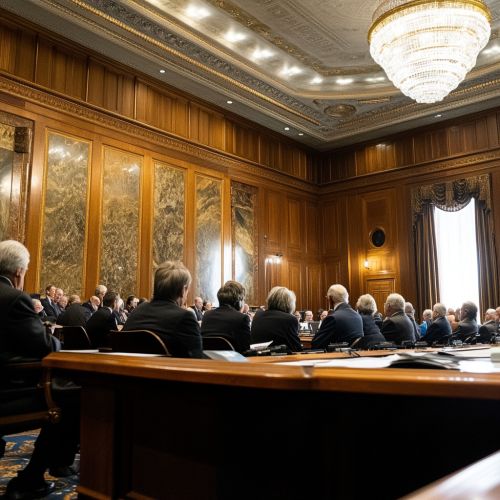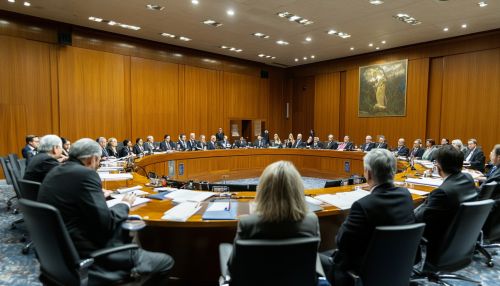Senate Committee on Environment and Public Works: Difference between revisions
(Created page with "== Senate Committee on Environment and Public Works == The Senate Committee on Environment and Public Works (EPW) is a standing committee of the United States Senate. The committee is responsible for addressing issues related to the environment, public infrastructure, and public works. Its jurisdiction encompasses a wide range of topics, including air and water quality, environmental protection, and the construction and maintenance of public infrastructure such as highw...") |
No edit summary |
||
| (One intermediate revision by the same user not shown) | |||
| Line 3: | Line 3: | ||
The Senate Committee on Environment and Public Works (EPW) is a standing committee of the United States Senate. The committee is responsible for addressing issues related to the environment, public infrastructure, and public works. Its jurisdiction encompasses a wide range of topics, including air and water quality, environmental protection, and the construction and maintenance of public infrastructure such as highways and bridges. | The Senate Committee on Environment and Public Works (EPW) is a standing committee of the United States Senate. The committee is responsible for addressing issues related to the environment, public infrastructure, and public works. Its jurisdiction encompasses a wide range of topics, including air and water quality, environmental protection, and the construction and maintenance of public infrastructure such as highways and bridges. | ||
[[Image:Detail-98239.jpg|thumb|center|Image of the Senate Committee on Environment and Public Works in session.|class=only_on_mobile]] | |||
[[Image:Detail-98240.jpg|thumb|center|Image of the Senate Committee on Environment and Public Works in session.|class=only_on_desktop]] | |||
=== History === | === History === | ||
Latest revision as of 20:39, 8 October 2024
Senate Committee on Environment and Public Works
The Senate Committee on Environment and Public Works (EPW) is a standing committee of the United States Senate. The committee is responsible for addressing issues related to the environment, public infrastructure, and public works. Its jurisdiction encompasses a wide range of topics, including air and water quality, environmental protection, and the construction and maintenance of public infrastructure such as highways and bridges.


History
The Senate Committee on Environment and Public Works was established in 1837, originally known as the Committee on Public Buildings and Grounds. Over the years, the committee's scope expanded to include various aspects of environmental policy and infrastructure development. In 1977, the committee was renamed to its current title to reflect its broader responsibilities.
Jurisdiction and Responsibilities
The committee's jurisdiction includes a wide array of issues related to environmental protection and public infrastructure. Key areas of focus include:
- **Air Quality**: The committee oversees legislation related to air pollution control, including the Clean Air Act. This act regulates air emissions from stationary and mobile sources to ensure that air quality standards are met.
- **Water Quality**: The committee is responsible for the Clean Water Act, which aims to restore and maintain the integrity of the nation's waters. This includes regulating discharges of pollutants into water bodies and setting quality standards for surface waters.
- **Waste Management**: The committee addresses issues related to the disposal and management of hazardous and non-hazardous waste. This includes oversight of the Resource Conservation and Recovery Act (RCRA), which governs the disposal of solid and hazardous waste.
- **Toxic Substances**: The committee oversees the Toxic Substances Control Act (TSCA), which regulates the introduction of new or already existing chemicals. The act requires reporting, record-keeping, and testing requirements, and restrictions relating to chemical substances.
- **Infrastructure**: The committee is responsible for the development and maintenance of the nation's infrastructure, including highways, bridges, and public buildings. This includes oversight of the Federal Highway Administration (FHWA) and the General Services Administration (GSA).
- **Environmental Protection Agency (EPA)**: The committee has oversight responsibilities for the EPA, which is the federal agency responsible for protecting human health and the environment by writing and enforcing regulations based on laws passed by Congress.
Subcommittees
The Senate Committee on Environment and Public Works is divided into several subcommittees, each focusing on specific areas within the committee's jurisdiction. These subcommittees include:
- **Subcommittee on Clean Air and Nuclear Safety**: This subcommittee focuses on issues related to air quality, climate change, and nuclear safety. It oversees the Clean Air Act and the Nuclear Regulatory Commission (NRC).
- **Subcommittee on Fisheries, Water, and Wildlife**: This subcommittee addresses issues related to water quality, fisheries, and wildlife conservation. It oversees the Clean Water Act and the Endangered Species Act.
- **Subcommittee on Transportation and Infrastructure**: This subcommittee focuses on the development and maintenance of transportation infrastructure, including highways, bridges, and public transit systems. It oversees the Federal Highway Administration and the Federal Transit Administration (FTA).
- **Subcommittee on Superfund, Waste Management, and Regulatory Oversight**: This subcommittee addresses issues related to hazardous waste management, Superfund sites, and regulatory oversight. It oversees the Comprehensive Environmental Response, Compensation, and Liability Act (CERCLA) and the Resource Conservation and Recovery Act (RCRA).
Legislative Achievements
The Senate Committee on Environment and Public Works has been instrumental in the passage of several landmark pieces of legislation. Some of the most significant legislative achievements include:
- **Clean Air Act (1970)**: This act established a comprehensive federal program to regulate air pollution from stationary and mobile sources. It authorized the EPA to establish National Ambient Air Quality Standards (NAAQS) to protect public health and the environment.
- **Clean Water Act (1972)**: This act aimed to restore and maintain the integrity of the nation's waters by regulating discharges of pollutants and setting water quality standards. It also provided funding for the construction of sewage treatment plants.
- **Endangered Species Act (1973)**: This act provides for the conservation of species that are endangered or threatened and the ecosystems on which they depend. It authorizes the listing of species as endangered or threatened and provides measures for their protection and recovery.
- **Resource Conservation and Recovery Act (1976)**: This act governs the disposal of solid and hazardous waste. It establishes a framework for the management of non-hazardous and hazardous waste, including the generation, transportation, treatment, storage, and disposal of hazardous waste.
- **Comprehensive Environmental Response, Compensation, and Liability Act (1980)**: Commonly known as Superfund, this act provides for the cleanup of hazardous waste sites and holds responsible parties accountable for the release of hazardous substances.
Current Issues and Challenges
The Senate Committee on Environment and Public Works continues to address a wide range of contemporary issues and challenges. Some of the current focus areas include:
- **Climate Change**: The committee is actively involved in addressing the impacts of climate change, including the reduction of greenhouse gas emissions and the promotion of renewable energy sources. This includes oversight of the EPA's regulations on carbon emissions and the implementation of climate adaptation and resilience strategies.
- **Infrastructure Modernization**: The committee is working on modernizing the nation's infrastructure to meet the demands of the 21st century. This includes addressing the aging transportation infrastructure, improving public transit systems, and investing in sustainable infrastructure projects.
- **Water Resources**: The committee is focused on ensuring the availability and quality of water resources. This includes addressing issues related to water scarcity, water pollution, and the protection of aquatic ecosystems.
- **Environmental Justice**: The committee is committed to addressing environmental justice issues, ensuring that all communities, particularly those that are marginalized or disadvantaged, have access to a clean and healthy environment. This includes addressing the disproportionate impacts of environmental hazards on low-income and minority communities.
- **Chemical Safety**: The committee is working on improving the safety of chemicals used in commerce. This includes updating regulations under the Toxic Substances Control Act (TSCA) to ensure that chemicals are evaluated for safety and that risks are managed effectively.
Members
The composition of the Senate Committee on Environment and Public Works includes members from both the Democratic and Republican parties. The committee is chaired by a member of the majority party, with a ranking member from the minority party. The members are appointed based on their expertise and interest in environmental and public works issues.
